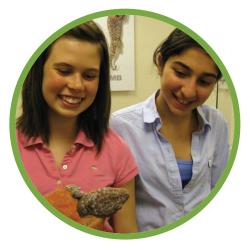Source Institutions
Source Institutions
Add to list Go to activity
Activity link broken? See if it's at the internet archive

This is an activity (located on page 3 of PDF under Gecko Feet Activity) about modeling a nanoscale phenomenon (gravity-defying gecko feet) with macroscale objects (shoes). Using shoes and some chalk, learners will calculate how much area of the shoe's sole actually comes in contact with the ground. At the nanoscale, many split ends on a gecko's toe hairs make maximum contact with a surface, allowing the gecko to do amazing feats like climb walls. Relates to linked video, DragonflyTV Nano: Gecko Feet.
- Under 5 minutes
- 2 to 4 hours
- $1 - $5 per group of students
- Ages 8 - 14
- Activity, Lesson/Lesson Plan
- English
Quick Guide
Materials List (per group of students)
- shoes with different soles that you don’t mind getting a little dirty (e.g., a sneaker and flat dress shoe)
- crushed sidewalk chalk (not white)
- shoebox
- graph paper and pencils
Subjects
-
Engineering and Technology
-
Engineering
- Nanotechnology
-
Engineering
-
Life Sciences
-
Diversity of Life
- Animals
-
Diversity of Life
-
Mathematics
-
Data Analysis and Probability
- Data Analysis
- Data Collection
- Data Representation
-
Measurement
- Size and Scale
-
Number and Operations
- Fractions
-
Data Analysis and Probability
-
Physical Sciences
-
Motion and Forces
- Gravity
- Structure and Properties of Matter
-
Motion and Forces
-
The Nature of Science
-
The Scientific Process
- Conducting Investigations
- Gathering Data
- Formulating Explanations
- Communicating Results
-
The Scientific Process
Audience
To use this activity, learners need to:
- see
- see color
- touch
Learning styles supported:
- Involves hands-on or lab activities
Other
Components that are part of this resource:
Includes alignment to state and/or national standards:
This resource is part of:
Access Rights:
- Free access
By:
Source Collection
- DragonflyTV
Rights:
- All rights reserved, Twin Cities Public Television, Inc., 2008
Funding Source:
- National Science Foundation, 741749
